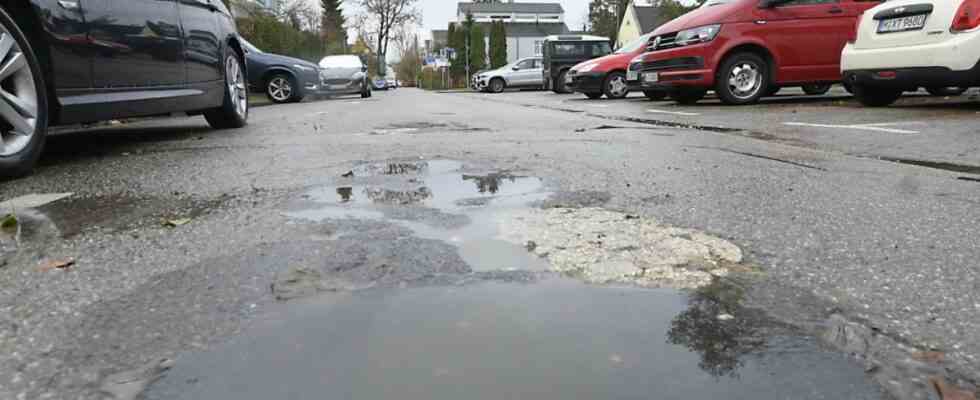In the Unterhachinger local area there are some streets on which drivers and cyclists are shaken roughly because one pothole follows the next almost seamlessly. And that doesn’t always have to do with the fact that the asphalt surface has to be constantly torn open to lay geothermal energy connections. Many streets are simply getting on in years and should urgently be renovated. But that costs a lot of money, which the community currently does not have. Due to a trade tax repayment of twelve million euros, a budget freeze is currently in force, on the other hand, road rehabilitation is one of the compulsory tasks of a municipality. A dilemma that causes headaches for the local councillors.
At Lohestrasse, for example, the connection between Karl-Mathesstrasse and Sommerstrasse, it is not just about renewing the 52-year-old roadway. Rather, concrete requirements for climate resilience and climate protection should actually be met. But you can’t actually afford that in the current financial situation. The road section would have to be rebuilt with more seepage areas and green islands in such a way that it would still be optimal in 50 years. “Then we will have a climate here like in Milan,” said head of the building department Stefan Lauszat to the municipal council at its meeting on Wednesday evening. This variant of renovation and conversion would cost around 450,000 euros. The week before, the building committee had narrowly managed to do so, while the finance committee rejected the plans with an equally wafer-thin majority. The municipal council has now reached a compromise, making makeshift repairs to the road for 20,000 euros in the coming year and not planning the renovation until 2024.
Because they didn’t want to ask the residents to pay, nothing happened for years
The fact that Lohestraße is by far not the only street in Unterhaching that urgently needs to be repaired or even completely renovated is also due to the fact that until the abolition of the road development contribution statute almost five years ago, the municipality had shied away from closing streets in residential areas repair, because at that time the local residents had to be asked to pay for the construction work. “That’s why we avoided road repairs like the devil avoids holy water,” Mayor Wolfgang Panzer (SPD) explained the renovation backlog that had now started. The head of the town hall still remembers the protests of local residents all too well when the municipality then tackled a renovation because it considered it unavoidable.
Since 2018, the municipality has had to pay for the road expansion itself. There are 240 roads and trails in the community, and if they all last for 50 years, six roads would need repairs each year. According to Lauszat, there is a pot with the ten worst, then it is looked at which of these streets is the worst, which is then renovated. The Lohestraße was also at the top of this hit list because it was also affected in the course of the renovation of the local playground and the recycling point. This procedure is not ideal, as the head of the building authority admits. “We drive on wear and tear, that’s the plain truth.” The CSU calls this “flickschusterei”, the big “master plan” that the FDP has been calling for for a long time does not exist.
In return, however, the will of the municipal council to become climate-neutral has been internalized in the town hall. It’s also about the question: “What can roads do?” Lauszat said. On the one hand, one or the other tree will be planted, but the conversion with wider sidewalks should also encourage people to walk or cycle more again. Presumably not all residents will be enthusiastic about this, since this will also eliminate the need for parking spaces. The municipality is planning citizen participation, but also makes it clear: “Overriding municipal goals such as climate neutrality should be given greater weight, especially because the measures are not financed by resident contributions, but by general tax funds.”

